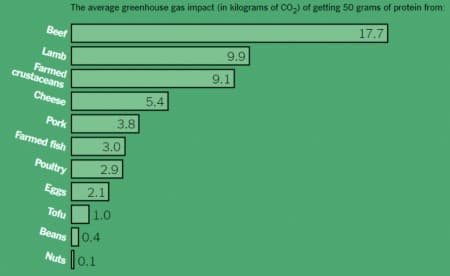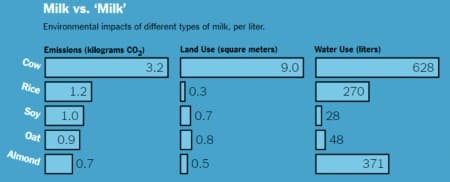Bad news for meat worshipers. Eating healthy isn't just good for your body--it’s good for the environment, too, according to a series of new studies, suggesting that only vegetarians can save the planet.
The fight against climate change is already polarizing enough without adding the meat-plant divide.
But new studies insist that what we eat has quite a lot to do with climate change. It’s not just about food security or species extinction, either.
Today’s food supply chain creates around 13.7 billion metric tons of carbon dioxide equivalents and 26 percent of anthropogenic greenhouse gas (GHG) emissions.
A further 2.8 billion metric tons of carbon dioxide equivalents (5 percent) are caused by nonfood agriculture and other drivers of deforestation.
A study from 2017 found that if citizens in 28 high-income nations like the United States, Germany, and Japan actually followed the dietary recommendations of their respective governments, greenhouse gases related to the production of the food they eat would fall by 13 percent to 25 percent. But giving up meat is hard to do.
According to the not-for-profit environmental research group World Resources Institute, humanity is not on track to meet Mission 2020, the parameters laid out to prevent catastrophic global warming and irreversible environmental damage.
With the global population growing from 7 billion in 2010 to a projected ~10 billion in 2050, and income growth across the developing world, overall food demand is set to increase by more than 50 percent. Meanwhile, demand for delicious animal-based foods is set to increase by nearly 70 percent.
With agriculture already using almost half of the world’s vegetated land, and agriculture and related land-use change generating one-quarter of our annual greenhouse gas (GHG) emissions, what we eat has, perhaps, growing implications for topsoil, pollution, greenhouse gases, and deforestation. Related: Google Moves Smartphone Production To Vietnam
Deleting meat and animal products from the menu might be unthinkable for many people but sparing cows would significantly reduce negative effects on the environment. Meat, sadly enough, are apparently the worst type of food, because of the scale of resources that go into their production. Yes, meat may be a great source of protein, but its production is extremely energy-intensive.
How much energy does it take to produce a steak?
Meat and dairy products, particularly from cows and other livestock, account for around 14.5 percent of the world's greenhouse gases each year, which is about the same amount as emissions from all cars, trucks, airplanes, and ships combined.
According to a study published last year in the journal Science, beef and lamb have the biggest climate footprint per gram of protein, followed by pork and chicken. In this calculation of the average greenhouse gas emission associated with different foods, plant-based foods tend to have the smallest impact. Of course, they are also less yummy.
Thankfully, this doesn’t mean we all have to go vegan. Just eating less beef, lamb and cheese would be enough.

(Click to enlarge)
Source: Poore and Nemecek, Science
Milk has a smaller climate footprint than chicken, eggs, or pork per pound, according to study, as does yogurt, cottage cheese and cream cheese. But not all dairy is created equal. Cheddar or mozzarella cheese can have a significantly bigger footprint than even chicken or pork, since it typically takes about 10 pounds of milk to make one pound of cheese. Related: Space Crime And Scandal Overshadow SpaceX Failure
So it all depends on what cheese do you decide to eat—just being a vegetarian might not be a good solution if you’re stuck on cheese with a higher carbon footprint. In any case, almond, oat, and soy milk is a better choice than cow milk.

(Click to enlarge)
Source: Poore and Nemecek, Science
Eating meat is not the only thing causing climate change problems, some experts say. We also have to take into account food waste. According to the United States Department of Agriculture, Americans throw out around 20 percent of the food they buy. All the energy used for producing that same wasted food is also wasted.
Changing the way we eat—completely changing the way we eat—may be unpalatable for some. But experts contend that making just a few changes in your food habits is enough to improve your health and make a positive difference on the planet.
And Millennials are already doing this.
According to OnePoll study, close to 60 percent of Millennials are currently following a certain diet, such as vegan, keto, whole 30 and others, the New York Post reported. And that's not all. The reason behind adopting that special diet is that 44 percent of those Millennials believe it is better for the environment, while 37 percent think it is more ethical. In addition, one-third of Millennials have cut down on their meat consumption.
By Charles Kennedy for Oilprice.com
















